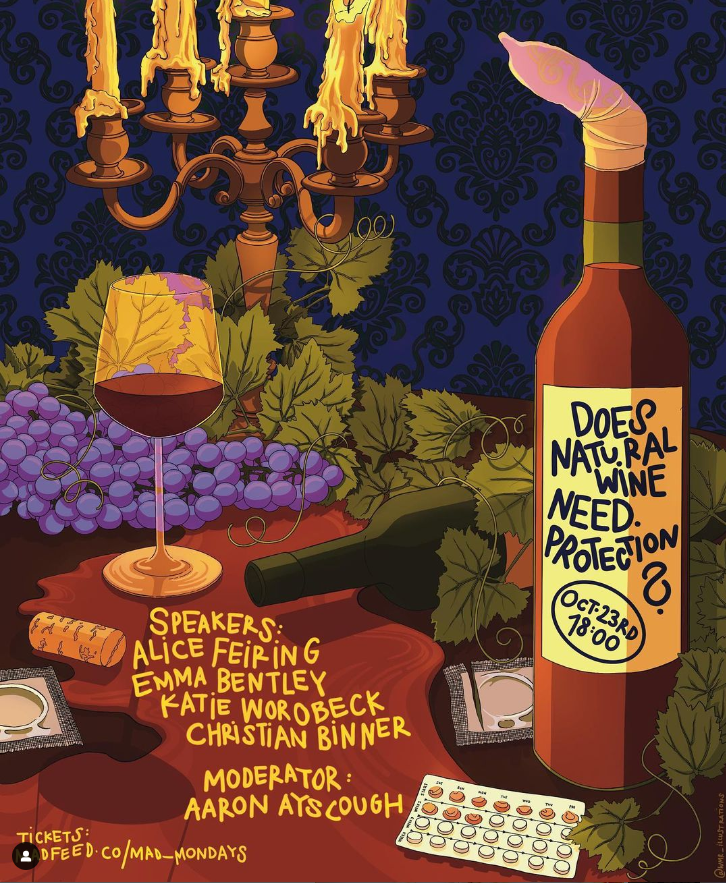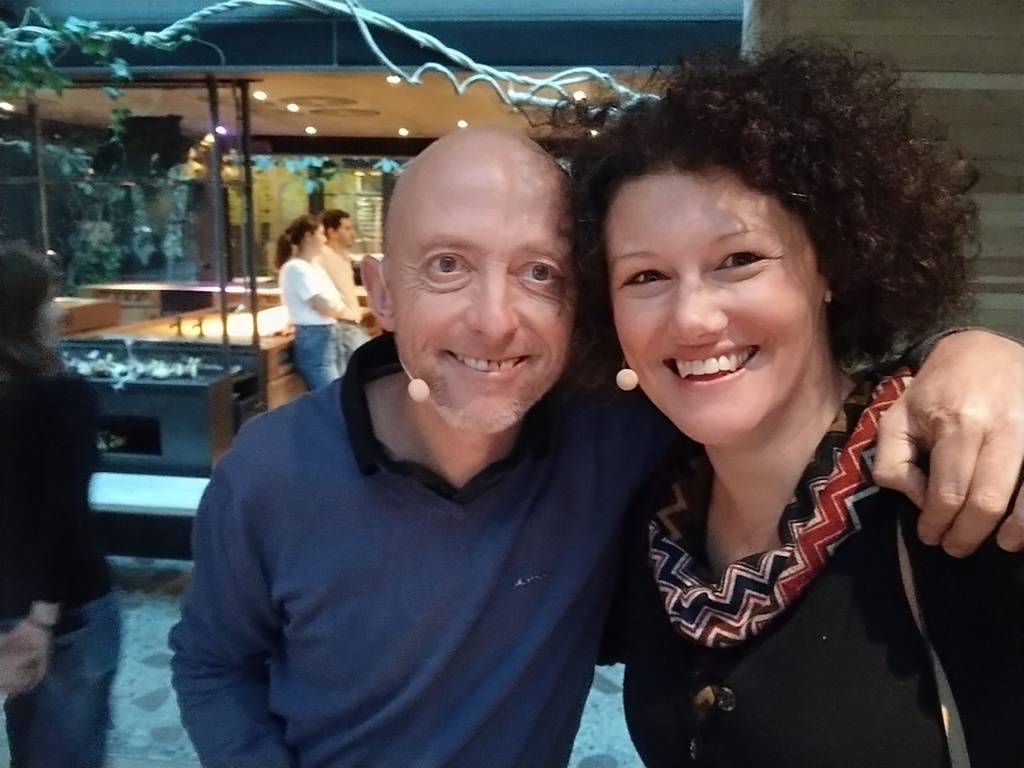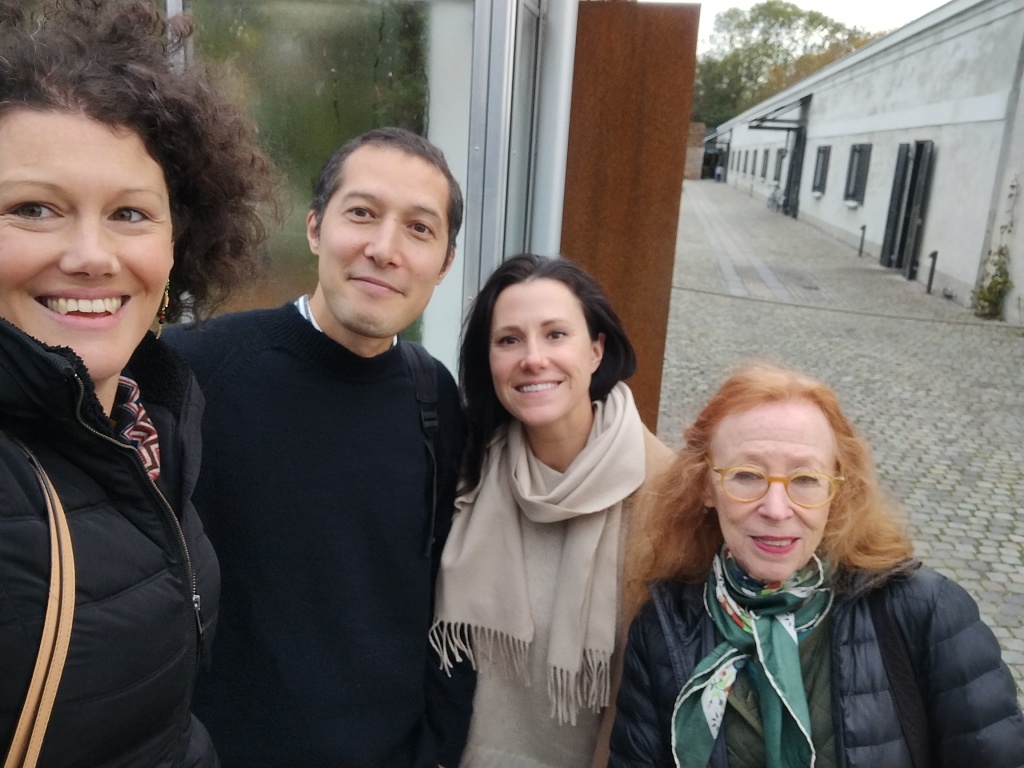
That was the title of a debate held last week at the restaurant Noma in Copenhagen. I was honoured to be one of the speakers at this event, organised by a not-for-profit organisation called MAD (“food” in Danish) which holds talks and events for the hospitality industry.
The moderator at last week’s debate was Aaron Ayscough, whom I’m sure you know because of his book published last year, or his blog Not Drinking Poison. We thought we met in Paris about a decade ago, but it turns out – in another turn of events that reminds you how small the world actually is – that we attended the same primary school. If you’re not familiar with Aaron’s writing, you should sign up to his Substack.
The other speakers were Katie Worobeck, Canadian export now turned micro-winemaker with 3 hectares near Rotalier, Jura (under the name Maison Maenad), Christian Binner (established winemaker in Ammerschwihr, Alsace and on the board of the Syndicat de défense des vins naturels aka “Vin Méthode Nature“) and Alice Feiring. The latter surely needs no introduction.
The audience – a wonderfully engaged and attentive group of 120 people – were given the opportunity to vote at the beginning of the event. 34% in favour of protection; about 50% undecided. At the end of the debate, 54% were in favour so I’m pleased to say that we were able to convince 24 people in the room.
My line of reasoning was very simple. Natural wine does need protection; and by protection, I mean that it needs certification, but first it needs a universally-accepted definition. This certification is not to protect the winemakers; Katie spoke before me, arguing against additional bureaucracy for the vigneron.ne.s so I picked up on that point, turning it to address the consumer – they’re the ones who need the protection. While there is ambiguity about what a natural wine is, anyone can claim to make it and how is a consumer going to know the difference?
Christian spoke about how, when he started making wine, he knew each and every person who bought his wine personally; now it’s not possible because his wine is sold around the world. I built upon that too, saying how a wine drinker might want to buy a natural wine but cannot keep track of all the new wines being made around the world. The natural wine movement has become too large for word-of-mouth; isn’t the green leaf showing organic agriculture beautifully simple at conveying the message?
[Deep breath, quick sip of water, and approach from a different angle.]

The VinNatur Association has a two page charter, outlining the allowed and forbidden practices in the vineyard and the cellar. It was approved by the associate-winemakers in 2016, not without a fair bit of controversy at first.
A charter, or a definition, is worth nothing if it is not enforced. And who to enforce it? [Here I had to be succinct if I was going to stay within my alloted 5 minutes so I left that as a rhetorical question and explained what VinNatur do.] VinNatur tried four different companies and sent them to visit a selection of our winemakers. They got feedback from everyone and chose the best, a company called Valoritalia. They then personally trained their inspectors and they helped draw up the Check Plan which is used during the inspection visits. These visits last no longer than an hour, take place every 2 or 3 years and are of no additional cost to the winemaker.
Why does VinNatur do all this? To defend our little corner from being abused by large, conventional producers who want to pass themselves as being natural. We’ve all seen buzzwords like “skin contact” and “no sulphites” but applied to wines which were not farmed organically and which were vinified by a conventional oenologist but were designed to appeal to the natural wine target audience. No certification is perfect, but the existence of a framework and the threat of being inspected is better than nothing.
I won’t reveal all my arguments and examples here, just in case we do a re-run of the debate in the future (yes, MAD team, I really hope we do!) but I will leave you with my closing argument:
Wine consumption is decreasing around the world, sales are slowing down and winemakers are feeling the pinch and becoming anxious about the future. But the natural wine category is bucking that trend and so it’s logical and understandable that large, conventional winemakers are trying to jump aboard. If we can certify organic wine, and we can certify biodynamic wine, why can’t we certify natural wine?

December 2023 update : do you want to hear the debate for yourself? Excitingly, the MAD team have made an audio recording available! If you make a donation, through their website, and thereby help them continue to serve the hospitality community with the education and inspiration it needs to make restaurants more socially and environmentally sustainable, you’ll be send a link to download the debate in podcast format.
